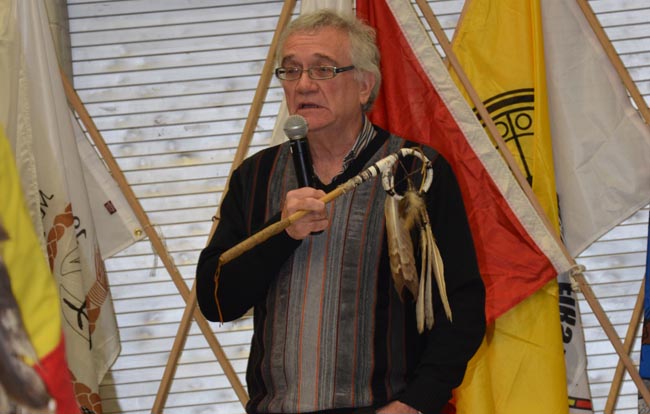Respecting, honouring First Nations education

By Kelly Crawford
NIPISSING FIRST NATION – John Donnelly, lead negotiator for the Mi’kmaw Kina’matneway presented on the comprehensive Education Agreement with Nova Scotia during the Anishinabek Nation Special Fall Assembly on Education held on Nov. 13-14, 2013.
“The Mi’kmaw have been exercising their jurisdiction for the past 15 years,” explained Donnelly. “Last year we had 30 students that were ready to drop out of a provincial high school We got them into the community school and they went to school for three to 10 at night. Out of 30 students, 29 received all the required credits to graduate.”
The Mi’kmaw Kina’matnewey have control over their education system supported by an “act respecting and honouring education within the territories of the Mi’kmaq of Nova Scotia”.
Donnelly shared the positive results of having immersion programs within the communities. “By the time the immersion students reach grade six, they are surpassing the performance level of the rest of the students in English. They spend their first three years exclusively in Mi’kmaw but by Grade six the test results for them in English Comprehension surpass all the other students.
The successes are not limited to just the Mi’kmaw. “In Nova Scotia, every student is exposed to the Mi’kmaw history and culture.” Donnelly explained that the Mi’kmaw Kina’matnewey play a foundational role in curriculum development with respect to Mi’kmaw language and history for the entire province of Nova Scotia. They are currently in talks to implement a mandatory Mi’kmaw course in order to obtain a high school diploma.
Donnelly explained an additional success is the change in the relationship with the province. “Once the province of Nova Scotia recognized that the Mi’kmaq have jurisdiction our relationship changed significantly. The relationship we have with the province is one of equals. We sit at the table together as equals” Benefits include having provincial contributions. “We have access to provincial resources including full access to every training program for teachers and administrators at no cost.”
Donnelly indicated that the funding currently received is far beyond any amount received while under Indian Act funding as the province contributes resources and training opportunities. Challenges still exist with getting the federal government to recognize new programs. Despite this they have been able to build five new schools, continue to support increased graduation rates and implement programs for at-risk students.
The Mi’kmaw jurisdiction was recognized by the federal and provincial government through legislation; Bill 30 on June 18, 1998 and Bill No.4 on December 3, 1998. For more information contact roj@anishinabek.ca


